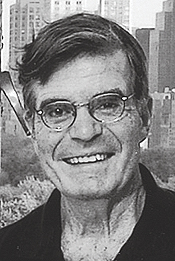Q&A: Ted Sorensen (Counselor: A Life at the Edge of History)
 Theodore "Ted" Sorensen (b. 1928) was JFK's go-to guy for speechwriting and domestic policy issues during Kennedy's 1000-day presidency. In his memoir out this month, Counselor: A Life at the Edge of History (LJ 4/15/08), Sorensen writes mostly of those years with the president, but he also includes illuminating accounts of his own childhood and of his many years as a lawyer in New York after JFK's death.
Theodore "Ted" Sorensen (b. 1928) was JFK's go-to guy for speechwriting and domestic policy issues during Kennedy's 1000-day presidency. In his memoir out this month, Counselor: A Life at the Edge of History (LJ 4/15/08), Sorensen writes mostly of those years with the president, but he also includes illuminating accounts of his own childhood and of his many years as a lawyer in New York after JFK's death.
Unlike many political memoirs, yours includes details on your years before politics. How did your roots make you the person you became?
My memoir includes lengthy chapters on my years before politics, including my Nebraska childhood, my parents, and my religion. This part of my life is key to understanding the source of the ideas and ideals I conveyed to John F. Kennedy in my 11 years with him.
How did a young lawyer from rural Nebraska come to work for a young senator from cosmopolitan Boston?
I worked briefly for a joint Congressional committee chaired by Sen. Paul Douglas of Illinois, and he recommended me to the newly elected senator from Massachusetts, John F. Kennedy, with whom Douglas had worked when Kennedy was in the House of Representatives. JFK and I found that we thought very much alike.
Please comment on your close relationship to JFK. What events brought you together?
My close relationship to JFK was sealed when, in 1956, as invitations poured into his office from across the nation after his starring role in the 1956 Democratic Convention, he asked me to accompany him as he explored the possibility of a presidential bid. For the next three years and more, we toured all 50 states together.
You recount the events of the Cuban Missile Crisis in harrowing detail. What role did you play and how do you assess JFK's leadership through the ordeal?
During the 13 days of the Cuban Missile Crisis, now termed by historians "the 13 most dangerous days in the history of mankind," I was a member of the group of advisers whose judgment and recommendations he sought, later formally termed The Executive Committee of the National Security Council, or EXCOMM. I offered questions, suggestions, and criticisms during our discussions and was specifically asked to employ my pen on at least three crucial occasions: attempting to draft a presidential note to Soviet Chairman Khrushchev advising him of America's intention to bomb missile sites in Cuba, an option subsequently rejected by EXCOMM and the president; drafting the President's comprehensive, televised report to the nation and world on our discovery of the missiles in Cuba and formulation of a U.S. response aimed at obtaining their withdrawal; and drafting for the President's final approval his letter to Chairman Khrushchev, in response to the first of two contradictory letters received from him on the penultimate day of the crisis, setting forth the basis on which both parties might step back and peacefully resolve the crisis. Until comparatively recently, I did not know (nor did anyone else) that the Soviet submarine accompanying the final Soviet ship approaching the U.S. naval blockade (or "quarantine") on that penultimate day was equipped with nuclear torpedoes. Nor did I know of the dangerous and outrageous demands from General LeMay and other members of the Joint Chiefs for a massive military attack on the Soviet missiles and Cuba, demands which Kennedy coolly and courageously resisted in favor of his more flexible and prudent approach.
You also had close relationships with Robert Kennedy and Ted Kennedy. A theme of your book is that all three Kennedy brothers were works in progress.
My 11 years with JFK enabled me to observe more closely his growth from a young, little-known Congressman still close to the conservative views of his father to a globally admired statesman willing to wage multilateral peace abroad and reverse America's centuries of racial discrimination at home.
You are one of the last surviving officials from the Kennedy administration. What do you remember as his most notable qualities and how is JFK relevant to today's political world?
Kennedy's most notable qualities were his probing, objective approach to all problems and his marvelous sense of both modesty and humor, qualities that have been sorely missed in these last years of hubris and bellicosity in American foreign policy.
RELATED
Lazarus Man
Before We Forget Kindness
Mr. Nice Spy
Freedom: Memoirs 1954–2021
ALREADY A SUBSCRIBER? LOG IN
We are currently offering this content for free. Sign up now to activate your personal profile, where you can save articles for future viewing









Add Comment :-
Comment Policy: